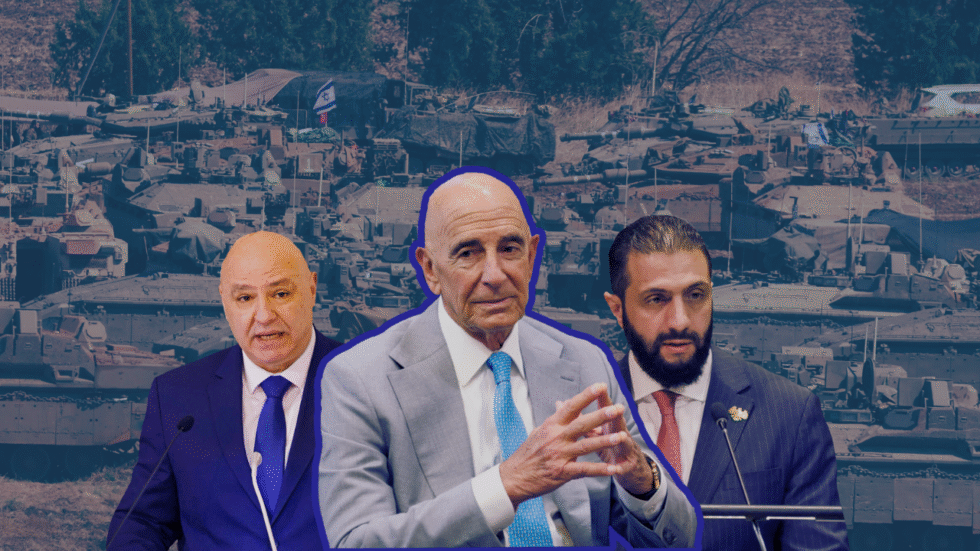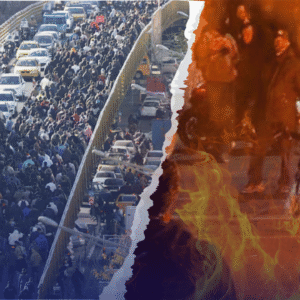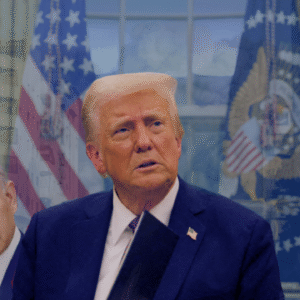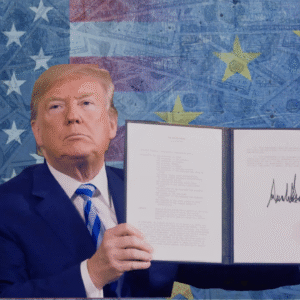How Washington’s Shadow Looms over Lebanon and Syria’s Fragile Future

The heads of Lebanon and Syria have aligned themselves with the world’s biggest sponsor of Zionism, trading their countries’ sovereignty for a form of diplomatic coercion. Jolani’s Syria, with President Joseph Aoun and PM Nawaf Salam’s Lebanon, have subscribed to U.S. demands for a “New Middle East,” which has left them with futile defensive capabilities against Zionist aggression.
Current diplomatic initiatives with the two countries, mediated by prominent U.S. figures like U.S. Envoy Tom Barrack, have prioritized the U.S. vision for demilitarizing all neighboring threats to the Zionist state.
The power imbalance between the U.S. and the Levantine countries turns diplomacy into the imposition of ultimatums rather than an exchange of demands. Regional leaders of economically-fragile and politically unstable states are expected to comply under the threat of sanctions or military action, with no ability to exercise leverage in diplomatic talks.
The current regimes governing Lebanon and Syria are not only accommodating U.S. and Israeli interests, but operating exclusively under the shadow of foreign influence. Rather than prioritizing national strength, Jolani, Aoun, and Salam have advanced the imperialist goals of demilitarization and occupation.
The Foreign Interventions that Forged Lebanon and Syria’s Fate
The new transitional government of Syria marked the end of more than a decade of domestic war. The U.S. and Israel orchestrated the collapse of the Assad government in 2024, providing intense military support for CIA-backed rebels. These rebels included the Free Syrian Army (FSA), which later rebranded into the Syrian National Army (SNA) and became prominent fighters during the final battles of regime takeover.
Operation Timber Sycamore was a classified weapons supply and training program run by the United States and backed by the UK, KSA, and other Arab governments. Beginning in late 2012, the CIA program was initiated during the Obama administration and lobbied for by Benjamin Netanyahu.
FSA and aligned fighters would train in Jordan and Turkey and fight against Assad forces in Syria. Weapons delivered by the U.S. and Israel would often be sold to or seized by Islamist factions like Jabhat al-Nusra (which now rebranded into HTS). While critics in the Obama administration prioritized the victory of CIA-backed rebels to Islamist fighters, these factions often shared similar extremist ideologies and fought alongside each other.
Israel had directly assisted both FSA and Islamist fighters like Fursan al-Jolan militarily. A report by Foreign Policy published in 2018 claimed that Israel armed and funded at least 12 rebel groups in Southern Syria. Firqat Ahrar Nawa, an FSA faction, once posted a YouTube video showcasing a truck full of containers with Israeli markings. Yediot Achronot’s chief military-security correspondent, Alex Fishman, confirmed another report by The Wall Street Journal, saying:
“A not insignificant portion of the Syrian rebels in the Golan have adopted the extreme Salafist ideology of Jabhat al-Nusra, an offshoot of al-Qaeda…The Israeli view is that the religious extremist views of the Syrian rebels are less relevant… According to Israel’s perspective, the enemy of my enemy is my friend. And if Jabhat al-Nusra fights against IS in the southern Golan, and each of them in turn fights against Hezbollah and the Syrian army in the Deraa region – all the better.”
Netanyahu has called the day of Assad’s fall a “historic day” and his demise a “direct result of the blows we have inflicted on Iran and Hezbollah, the main supporters of the Assad regime.”
Not long after designating Jolani a terrorist, U.S. officials abruptly revised their assessment of Syria’s interim president. Roger Carstens, who worked at the State Department during the first Trump administration said he walked away “impressed” after meeting him.
While the U.S. interventions in the election of Joseph Aoun and Nawaf Salam in Lebanon were void of the level of violent conflict seen in Syria, they have produced a similar outcome: a government designed to fulfill U.S. demands.
During the last presidential elections in Lebanon following the 2024 war with Israel, the U.S., along with Saudi Arabia, had consistently pressured Lebanese officials to place Joseph Aoun, the former army General, as the head of state. A senior Arab official told the Middle East Eye, “The Americans are dead set. They do not want any other candidate but Aoun. [U.S. Envoy] Hochstein has tied Aoun’s election to Saudi Arabia bankrolling Lebanon’s reconstruction.”
While Aoun served as an army chief, the Lebanese Army was kept out of the 2024 war with Israel leading the media framing the war as a battle “between Israel and Hezbollah.” Justifications in Lebanese discourse for accepting U.S.-Saudi pressure in the election of Aoun revolved around the foreign promises for reconstruction and economic rebuilding.
The nomination of Nawaf Salam to become PM by Western-backed MPs was rejected primarily by Hezbollah, labeling him as the U.S.-backed candidate. Salam was pressured by the U.S. to completely exclude Hezbollah from the new cabinet, a demand that ultimately failed to succeed. Yet, Salam has continued to express Western narratives regarding relations with Israel, including the move towards normalization in case of a “two-state solution.”
The installation of Jolani, Aoun, and Salam differed in their processes yet established similar state behaviors for Syria and Lebanon. The events leading up to their rule are important for understanding their interactions with domestic factions, the U.S., and the wider international community.
Diverging Scripts and Conflicting Agendas: Regional vs U.S. Narratives
Recent diplomatic initiatives, such as the annual UNGA assembly, have encompassed several statements by Lebanese, Syrian, and U.S. leaders. However, the past few weeks have witnessed contradictory statements over the political status of Lebanon and Syria between regional and U.S. officials.
During Trump and Jolani’s visit to Saudi Arabia, Trump had pledged to remove the sanctions over Syria and signed an executive order weeks later to lift them. Still, the debate over whether the Caesar Syria Civilian Protection Act that imposed sanctions on Damascus should end is ongoing. The suspension of the Caesar Act would condition the country to “maintain peace relations with other states in the region, including Israel.”
In his UNGA speech, Jolani said, “Israeli policies are being pursued in violation of the international position supporting Syria and its people, in an attempt to exploit the transitional phase—exposing the region to the risk of new cycles of conflict, the end of which no one knows.”
However, this statement comes in spite of direct talks with Israel over peace deals under Jolani’s leadership. Syria now faces double-edged pressure; While Israel lobbies the U.S. to keep Syria “weak” and decentralized, it is simultaneously pushed by the U.S. to pursue a “de-escalation” agreement.
Barrack has stated that as part of the agreement, the Zionist army will halt its attacks, while Syria will agree not to move any machinery or heavy equipment near the border with Israeli-occupied territories.
As part of the diplomatic cooperation between the U.S. and Syria, the U.S. plans to reduce the number of its troops in Syria from 2,000 to 1,000. Immediately after Assad’s fall, however, the U.S. deployed 1,000 troops quietly to Syria. The planned reduction will merely return the number of U.S. soldiers to the previous status quo.
Tom Barrack has also contradicted the statements of Lebanon’s president and prime minister. In his recent interview, Barrack has made several controversial claims over the political affairs in West Asia. The envoy’s interactions in Lebanese discourse have had an orientalist tone, pointing to a calculated strategy to invoke internal unrest while covering Zionist aggression.
Aoun and Salam have resorted to U.S. support to block Israeli violations on Lebanese sovereignty, but Barrack says, “Israel [is] a different story. Israel is a valued ally. We subsidise them $4 or $5 billion a year. It has a special place in America’s heart.”
Aoun and Salam claim to restore peace in the region. Barrack says, “When we say peace, it’s an illusion. There’s never been peace.” This contradiction underscores that as long as Zionist presence in West Asia continues, lasting peace remains out of reach for the region.
Aoun claims it is necessary to provide the “means to our legal armed forces so that they may take on tasks in defending and safekeeping our national integrity.” Barrack retorts, “Who are they going to fight? We don’t want to arm them so they can fight Israel? I don’t think so. So you’re arming them so they can fight their own people, Hezbollah. Hezbollah is our enemy. Iran is our enemy.” He reminds that the state’s forces will fail to defend Lebanon from Israel, and blames the organization for internal strife.
Salam calls for maximum pressure to be exerted on Israeli violations to the 2024 ceasefire agreement. Barrack states, “The U.S. has no business in trying to compel Israel to do anything… America could only influence.”
He later adds, “Israel has five points [that it still occupies in Lebanon] and is not withdrawing.” This statement reinforces the argument that resistance is the only viable solution against Zionist aggression, as international intervention is not designed to alter the actions of the occupation army.
These contradictory narratives demonstrate both the lack of credibility of U.S.-style diplomacy, and the hollow assurances of Lebanese officials which are detached from reality.
They also reflect the role of Lebanese and Syrian officials in continuing to partake in a zero-sum game with the main sponsor of the Zionist aggression at their borders—“the concerned parties,” as Aoun said in his UNGA speech, failed to even name the Zionist regime.
Diplomacy or Domination? Unmasking the Real Political Agenda
Israel has actively enforced a dynamic of colonial occupation on Lebanon and Syria, which creates a geographic threat to both countries considering their proximity to the Zionist regime.
Bolstered by unwavering support from the United States, Israel benefits from the demilitarization of its neighbors. Diplomatic initiatives with the U.S. thus place Israeli interests above Lebanon and Syria.
As Israel continues to occupy and fortify 5+ points in Southern Lebanon, it also builds new bases in Southern Syria. Pressuring the Lebanese government to disarm Hezbollah lest they act independently, they also demand a demilitarized zone in Syria to eliminate all possible armed threats northeast of occupied Palestine. Demilitarization carves the path for further occupation.
For the Zionist regime, it enables systematic control and unchallenged violence. Diplomacy for the U.S.-Zionist alliance is far from a tool of peace; it acts as a strategic instrument to consolidate dominance, suppress resistance, and advance the “Greater Israel” agenda. Today, the shadow looms over Lebanon and Syria, but threatens to stretch across the region, leaving its future uncertain.
If you value our journalism…
TMJ News is committed to remaining an independent, reader-funded news platform. A small donation from our valuable readers like you keeps us running so that we can keep our reporting open to all! We’ve launched a fundraising campaign to raise the $10,000 we need to meet our publishing costs this year, and it’d mean the world to us if you’d make a monthly or one-time donation to help. If you value what we publish and agree that our world needs alternative voices like ours in the media, please give what you can today.














